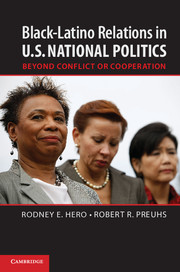Book contents
- Frontmatter
- Contents
- List of Tables and Figures
- Preface
- Acknowledgments
- Abbreviations
- 1 Introduction
- 2 What Previous Research Tells Us about Black-Latino Relations
- 3 Black-Latino Relations in Congressional Testimony and the Legal Arena
- 4 Salience and Congruence in Policy Positions
- 5 Black-Latino Relations in the U.S. House of Representatives
- 6 The Role of Group Interests and Ideology in Cross-Group Support
- 7 Further Explorations of Black-Latino Relations and Policies in National Politics
- 8 Conclusions
- Bibliography
- Index
3 - Black-Latino Relations in Congressional Testimony and the Legal Arena
Published online by Cambridge University Press: 05 February 2013
- Frontmatter
- Contents
- List of Tables and Figures
- Preface
- Acknowledgments
- Abbreviations
- 1 Introduction
- 2 What Previous Research Tells Us about Black-Latino Relations
- 3 Black-Latino Relations in Congressional Testimony and the Legal Arena
- 4 Salience and Congruence in Policy Positions
- 5 Black-Latino Relations in the U.S. House of Representatives
- 6 The Role of Group Interests and Ideology in Cross-Group Support
- 7 Further Explorations of Black-Latino Relations and Policies in National Politics
- 8 Conclusions
- Bibliography
- Index
Summary
As with American politics in general, black-Latino intergroup relations take place in various arenas in the political system and the groups’ interactions might well be affected by, and thus vary, across the different governmental, political, and policy contexts. In Chapter 2, we saw considerable evidence of “conflict” at the urban/local level and in mass attitudes regarding blacks and Latinos. In this chapter, we begin to examine black-Latino relations in a different governmental context – the national level – assessing the relations of black-Latino advocacy groups regarding two major policy-making institutions and certain access points for potential influence. Specifically, we focus on the efforts of black and Latino minority advocacy or interest groups seeking to influence policy in the U.S. Congress and the U.S. Supreme Court. We present evidence that allows us to assess similarities and/or differences in the groups’ policy concerns and positions as demonstrated in Congress, specifically, congressional testimony, and in the legal arena, the filing of amicus briefs. These data represent important additional evidence that is valuable for studying and advancing understanding of black and Latino interest group activity and intergroup relations. These questions have not been previously posed, or certainly not posed in quite this way, and this type of evidence has not previously been considered. As will be seen, we do not come across any signs of conflict in the extensive and varied evidence we consider, unlike what is often found in the urban-level data reviewed in the previous chapter. Instead, we see indications of “independence” and of some “cooperation.”
- Type
- Chapter
- Information
- Black–Latino Relations in U.S. National PoliticsBeyond Conflict or Cooperation, pp. 55 - 98Publisher: Cambridge University PressPrint publication year: 2013



